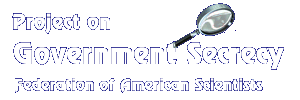 FAS |
Secrecy | 2006 News ||
Search |
Join FAS
FAS |
Secrecy | 2006 News ||
Search |
Join FAS

 |
|
|

Secrecy and Security News
Newer News: March 2006
February 2006
- Public Interest Declassification Board Holds First Meeting: Document Withdrawal from the National Archives a Serious Concern, NARA news release, February 28. "The withdrawal of historical documents from the open shelves of the National Archives initiated by some national security agencies was a focus of the inaugural meeting of the Public Interest Declassification Board held in Washington, DC on February 25, 2006."
- Decrying secrecy, citizen groups fight back by Aliya Sternstein, Federal Computer Week, February 27. "More federal agencies are taking data off the Web, while citizens seek ways to restore public access."
- US Reclassifies Government Memos, MSNBC.com, February 24. "The presence of American GIs and other U.N. troops in Korea in 1950 was well documented on film and in textbooks. But under a secret government program, memos on that war are among 9,500 documents now virtually erased from the National Archives."
- Secret Again: The absurd scheme to reclassify documents by Fred Kaplan, Slate, February 23. "Over the last five years, in a program that itself has been a secret, U.S. military and intelligence agencies have reclassified 9,500 documents, constituting more than 55,000 pages, some of them dating back to World War II."
- Document Withdrawal Notice from the National Archives. "In the review of this file this item was removed because access to it is restricted."
- Press Can Be Prosecuted for Having Secret Files, U.S. Says by Walter Pincus, Washington Post, February 22. "The Bush administration said that journalists can be prosecuted under current espionage laws for receiving and publishing classified information but that such a step 'would raise legitimate and serious issues and would not be undertaken lightly,' according to a court filing made public this week."
- The National Archives Responds to Reclassification of Documents, NARA news release, February 22. "Several weeks ago, the Information Security Oversight Office (ISOO), an office within the National Archives, initiated an audit of the above activity."
- U.S. Reclassifies Many Documents in Secret Review by Scott Shane, New York Times, February 21. "In a seven-year-old secret program at the National Archives, intelligence agencies have been removing from public access thousands of historical documents that were available for years, including some already published by the State Department and others photocopied years ago by private historians."
- CRS Attacked Again on Wiretap Bias by Shaun Waterman, United Press International, February 20. "Steven Aftergood, who runs the Project on Government Secrecy at the Federation of American Scientists, accused Mr. Sensenbrenner and his Republican allies of engaging in a campaign to stifle dissent."
- Cheney misuses expanded powers, Buffalo News (editorial), February 18. "Selectively applied, the declassification process can become political and sleazy."
- Cheney's Secret Powers by Dan Froomkin, Washington Post White House Briefing, February 17. "Toward the end of an interview that was primarily about his accidental shooting of a hunting buddy, Vice President Cheney on Wednesday made a blunt but possibly unjustified assertion about his power to declassify government secrets. Then he clammed up."
- The White House's maestro of secrets, Roanoke Times, February 17. "Vice President Cheney claims far more power over classified information than the president and the law likely grant."
- Activists assert secrecy is Cheney's hallmark by Charlie Savage, Boston Globe, February 17. "Criticism rained down on Vice President Dick Cheney this week for failing to disclose his hunting accident to the public for a day, but advocates of open government said the episode was nothing new. For five years, they said, Cheney has led the Bush administration's efforts to curtail the flow of government information."
- Washington: Lobbying for freedom of speech by Nathan Guttman, Jerusalem Post, February 16. "A legal document posted on the Web site of the Federation of American Scientists this week became an instant best-seller, with almost 4,000 downloads in a single day. This is remarkable, considering the fact that the document is a lengthy legal opinion under the not-so-appealing headline: "Memorandum of Law in support of Motion to Dismiss the Superseding indictments."
- A surge in whistle-blowing ... and reprisals by Gail Russell Chaddock, Christian Science Monitor, February 16. "Dissent often carries a price in official Washington, especially in the war years of the Bush presidency. Since the Sept. 11 attacks, the number of insiders alleging wrongdoing in government - either through whistle-blower channels or directly to the press - has surged, as have reprisals against them."
- American Bar Association Recommendation on "Sensitive But Unclassified" Information, adopted by the ABA House of Delegates on February 13. "The Recommendation urges the U.S. Attorney General to give guidance to federal agencies clarifying that designating a document as SBU does not constitute an independent legal basis for exempting information from public disclosure under the Freedom of Information Act (�FOIA�)."
- Big Impact Seen In Israel Spy Case by Josh Gerstein, New York Sun, February 13. "Lawyers for two former pro-Israel lobbyists under indictment for leaking classified information have denounced the prosecution as an assault on the First Amendment and warned that a vast array of policy advocates and journalists could be in jeopardy if the case goes forward."
- NRC Secrecy Policy Impedes Oversight of HEU Exports, letter from Alan J. Kuperman and Paul Leventhal of the Nuclear Control Institute, February 13. "We are concerned that the opportunity for meaningful public comment ... has been vitiated by the Commission�s new policy."
- Cheney Role Risks Political Fallout by Anne Marie Squeo and John D. McKinnon, Wall Street Journal, February 11. "The disclosure that Vice President Dick Cheney may have authorized his former chief of staff to release classified information to justify the war in Iraq has political consequences for the White House, but the legal fallout may be muted."
- Hoekstra attacks CRS 'bias' on spy program by Shaun Waterman, United Press International, February 9. "A powerful House committee chairman has blasted the Congressional Research Service for bias in two reports it produced on the National Security Agency's program of warrantless counter-terrorist surveillance."
- US plans massive data sweep by Mark Clayton, Christian Science Monitor, February 9. "The US government is developing a massive computer system that can collect huge amounts of data and, by linking far-flung information from blogs and e-mail to government records and intelligence reports, search for patterns of terrorist activity."
- Federation of American Scientists Files FOIA for Plame PDB by Mark G. Levey, DailyKos, February 8. "The Federation of American Scientists (FAS) has filed a FOIA request asking for declassification and release of the Presidential Daily Briefing (PDB) given to President Bush in June 2003, just weeks before the identity of CIA analyst Valerie Plame was illegally revealed."
- American Library Association Presents James Madison Award to Steven Aftergood, letter from ALA President Michael Gorman, February 7. "This award is, we believe, a fitting recognition of your effective voice for transparency and against unnecessary -- and often pointless -- government secrecy."
- Hoekstra blasts CRS for �bias�
by Jackie Kucinich, The Hill, February 7. "In a scathing letter, the chairman of the House Permanent Select Committee on Intelligence accused the Congressional Research Service (CRS) last week of issuing a partisan memorandum on domestic surveillance to the agency�s director."
- DOD denies reporters budget prep time by Pamela Hess, United Press International, February 6. "Breaking with years of past practice, the Office of the Secretary of Defense Monday declined to release its 2007 budget prior to a scheduled briefing on the $440 billion request."
- Government withholds 'sensitive-but-unclassified' information by Lance Gay, Scripps Howard News Service, February 2. "Government agencies have withdrawn from public scrutiny thousands of pages of information - ranging from information on the location of nuclear plants, to plant diseases that could devastate crops, to designs of bridge abutments."
- Gorbachev Proposes 1961 Soviet Sub Crew For Nobel Peace Prize, Interfax news agency, February 1. "Former Soviet President Mikhail Gorbachev has proposed nominating the crew of the Soviet nuclear submarine K-19 for a Nobel Peace Prize. The sailors contained a nuclear accident aboard the vessel on 4 July 1961."
Older News: January 2006
 FAS |
Secrecy |
2006 News ||
Search |
Join FAS
FAS |
Secrecy |
2006 News ||
Search |
Join FAS
 http://www.fas.org/sgp/news/2006/01/index.html
http://www.fas.org/sgp/news/2006/01/index.html
 Maintained by Steven Aftergood
Maintained by Steven Aftergood



